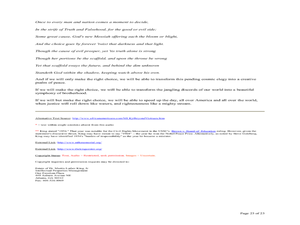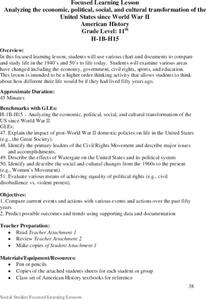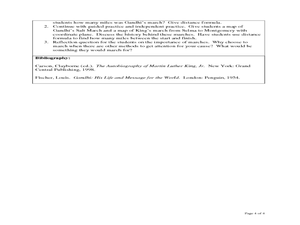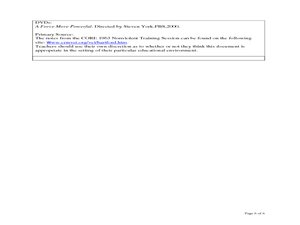Penguin Books
A Teacher's Guide to the Signet Classics Edition of Walden and "Civil Disobedience" by Henry David Thoreau
According to Henry David Thoreau, every citizen must object to unjust laws. The teacher's guide to Thoreau's "Civil Disobedience" begins with a detailed essay synopsis to help readers understand Thoreau's rationale in the challenging...
Curated OER
Civil Disobedience Action Plan
High schoolers investigate incidences of civil disobedience. In this civil disobedience lesson, students watch a video and read a newspaper article on civil disobedience. Then, in groups, they search a current newspaper for examples of...
Curated OER
Decision Making: Who Was Right?
Help your class explore the question "Is it ever right to disobey a law?" With a strong base of knowledge about the Civil War, anti-slavery movement, and Underground Railroad, your class explores civil disobedience in Marshall, Michigan...
Center for History Education
Slavery and Civil Disobedience: Christiana Riot of 1851
When is it a moral obligation to disobey the law or to fight back? Using primary sources that document the "Christiana Riot" of 1851, learners consider these questions. The firsthand accounts tell the story of the riot, which happened...
Curated OER
Muhammad Ali and his Vietnam War Resistance: Defining Nonviolent Action through Gandhi and King
Students research Muhammad Ali's act of civil disobedience. In this civil disobedience lesson, students research Ali's defiance of the Vietnam War draft and compare his reasoning to Martin Luther King's thoughts on the war. Students...
K20 LEARN
The Bank Of Justice: Civil Rights In The US
To launch a study of racial segregation and integration, young historians first watch a news video about a prom in Georgia that was first integrated in 2013. They then compare the goals in Lincoln's Gettysburg Address to King's "I Have a...
Facing History and Ourselves
Life for German Youth in the 1930s: Education, Propaganda, Conformity, and Obedience
The German youth faced an onslaught of propaganda when they went to school, thanks to the Nazi regime led by Hitler during World War II. Pupils relate their education experiences to German youth by analyzing primary source readings,...
Curated OER
America's Wars
Students classify information regarding American involvement in wars. In this classification lesson, students examine the causes of the war in which the United States has been involved, and classify them as mainly political, social,...
Facing History and Ourselves
Do You Take the Oath?
Why did so many go along with Nazi policies during World War II? An investigatory unit includes four handouts, reading analyses, classroom discussion topics, and intriguing philosophical questions, helping learners understand the...
Facing History and Ourselves
Laws and the National Community
When it comes to the law, is justice always served? Teach scholars about how law sometimes enables prejudice of entire groups of people with a unit on World War II that includes a warm-up activity, analysis of primary sources,...
Curated OER
An Eye for an Eye
Students watch a view introducing them to modern Indian History. During the film, they answer discussion quesitons and discover the concept of non-violent civil disobedience. They share their responses with the class and write an essay...
Curated OER
Abolitionists in U.S. History
Learners read and discuss excerpts from the writings of Henry David Thoreau, Frederick Douglass and Sarah Parker Redmond. They compare and contrast the views of the three abolitionists concentrating on the experiences and reasons for...
National Endowment for the Humanities
Revolution '67, Lesson 1: Protest: Why and How
To some people, protesting is as American as apple pie, but the factors that lead to protests can be as confusing to veteran activists as to today's youth. Revolution '67 explores the riots in Newark, New Jersey as a case study. ...
National Endowment for the Humanities
Revolution '67, Lesson 2: What Happened in July 1967? How Do We Know?
Even in a world in which dozens of participants and curious onlookers record every controversial event, the basic facts of what happened are often in dispute. Revolution '67, Lesson 2 explores 1967 Newark, New Jersey using an examination...
Curated OER
Analyzing the economic, political, social, and cultural transformation of the United States since World War II
Eleventh graders examine political issues in the United States between 1936 and 2000. In this American history instructional activity, 11th graders study the economy, education, government, civil rights, and sports of this time period....
Curated OER
Focused Learning Lesson
Eleventh graders analyze charts and primary source documents to compare life in the 1940s and 1950s. They are encouraged to examine the economy, government, sports and education.
Curated OER
Give Peace A Chance: Nonviolence as a valid strategy for social change
Students analyze how people solve conflicts. In this conflict resolution instructional activity, students look at Mahatma Gandhi and Martin Luther King's nonviolence movements. They see the reasoning behind nonviolence and how it...
Curated OER
Court Documents Related to
Students use the National Archives to researcj cout coduments related to Martin Luther King, Jr.
Curated OER
The Distance Formula and Marching Nonviolently for Social Change
Students explore the distance formula using real world data from nonviolent marches for social change. For this secondary mathematics lesson, students investigate the marches of Gandhi and King using maps overlaid with a coordinate...
Curated OER
ON BECOMING A NONVIOLENT WARRIOR
Students examine the concept of non-violent social change. In this lesson on social change, students research and role play to demonstrate ways in which this might be accomplished while making connections to various events in history.
Curated OER
Act of Sabotage?
Students examine animal cruelty laws in Great Britain. In this health lesson, students visit selected websites to research animal cruelty laws as they consider animal rights and hunting rights.
Curated OER
Rockin’ the World: Rock and Roll and Social Protest in 20th Century America
Students explore protest songs. In this interdisciplinary lesson, students examine issues-based music by summarizing lyrics and revealing inferences, generalizations, conclusions, and points of view found in the songs.
Curated OER
Oxymorons
In this vocabulary worksheet, students read 100 English oxymorons. They include "absolutely unsure" and "hone hundred and ten percent."
Curated OER
India History: The Big Picture
In this India history study guide worksheet, pupils read a brief overview pertaining to the history of India from about 1500 to the present.

























